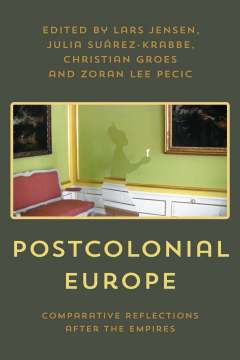
BOOK
Postcolonial Europe
Lars Jensen | Julia Suárez-Krabbe | Christian Groes | Zoran Lee Pecic
(2017)
Additional Information
Book Details
Abstract
How has European identity been shaped through its colonial empires? Does this history of imperialism influence the conceptualisation of Europe in the contemporary globalised world? How has coloniality shaped geopolitical differences within Europe? What does this mean for the future of Europe?
Postcolonial Europe: Comparative Reflections after the Empires brings together scholars from across disciplines to rethink European colonialism in the light of its vanishing empires and the rise of new global power structures. Taking an interdisciplinary approach to the postcolonial European legacy, the book argues that the commonly used nation-centric approach does not effectively capture the overlap between different colonial and postcolonial experiences across Europe.
A timely collection of essays that deconstructs the colonial legacy of Fortress Europe and its continual influence on global constellations of power. Packed with essays from various disciplines that cover a substantial part of the continent – from Denmark to Italy, and from Poland to Spain –, Postcolonial Europe offers a refreshing critique of the current political climate by exposing the internal, if not inverted, colonialisms within.
Birte Heidemann, Postdoctoral researcher in Postcolonial Literary and Cultural Studies at the University of Bremen
This wonderful collection demonstrates powerfully the importance of postcolonial theory to understanding contemporary Europe, as well as giving an acute sense of Europe as a contested and differentiated space. The emphasis on Europe’s internal differentiation captures significantly the various ways in which the colonial archives are re-evoked, with the different chapters providing insights into racism, otherness and geopolitics of the present.
Kristín Loftsdóttir, Professor of Cultural Anthropology at the University of Iceland
Postcolonial Europe is an important and timely contribution that pushes the boundaries of postcolonial studies beyond the normative rhetoric of Centre and Periphery. This book unravels the complex articulations and formations of Europe, by interrogating the significance of its geography of powers as a series of performative manifestations of and reactions to anachronist colonialist practices. The collection posits Europe as a prismatic space whose margins open up a number of productive interrogations on the very notion of modernity.
Maria Ridda, Associate Lecturer in the School of English at the University of Kent
Lars Jensen is Associate Professor of Cultural Encounters in the Department of Communication and Arts at Roskilde University, Denmark.
Julia Suárez-Krabbe is Associate Professor of Cultural Encounters in the Department of Communication and Arts at Roskilde University, Denmark.
Christian Groes is Associate Professor of Cultural Encounters in the Department of Communication and Arts at Roskilde University, Denmark.
Zoran Lee Pecic is a Part-Time Lecturer in the Department of Cross-Cultural and Regional Studies, University of Copehagen.
This very important and timely book sheds much needed light on how Europe is still obsessed by the material, ontological and epistemological borders that protect its colonial legacy. In a time when populism, racism and anti-intellectualism resurge, it performs the crucially important work of collapsing the myths of European exceptionalism that still nurture both the former powerhouses of colonialism and the western nations seemingly marginal to this enterprise.
Johan Höglund, Associate Professor in English at Linnaeus University
This compelling volume demonstrates that decolonization is an ongoing process affecting all Europeans now. Its authors invite us to reassess the intellectual and cultural geography of European colonialism and reflect on its racial and dehumanizing legacies. At the crossroads between postcolonial and decolonial studies, this book argues that colonial tropes and rhetoric still underpin contemporary narratives of nationhood and otherhood.
Pierre-Philippe Fraiture, Head of French Studies at the University of Warwick, UK
Table of Contents
| Section Title | Page | Action | Price |
|---|---|---|---|
| Postcolonial Europe | Cover | ||
| Contents | v | ||
| Introduction | 1 | ||
| 1 Uneven Whiteness: Images of Blackness and Whiteness in Contemporary (Postcolonial) Italy (2010–2012) | 15 | ||
| 2 Challenging the Domestic Colonial Archive: Notes on the Racialization of the Italian Mezzogiorno | 29 | ||
| 3 El Moro – Discovering the Hidden Coloniality of the Contemporary Spanish/Catalan Society and Its Colonial Subjects | 43 | ||
| 4 The Coloniality of Power and the Disempowerment of the Roma | 61 | ||
| 5 Claiming Greyness: Dutch Coloniality against Polarization | 75 | ||
| 6 How to Draw a Haunted Nation: Colonial Ghosts and Spectres in Conceição Lima’s Poems | 91 | ||
| 7 Who Speaks the Postcolonial Community? Reflections on Language, Community and Imperial Nostalgia within the European Continent | 103 | ||
| 8 ‘Translation as a Place of Loss’: A Study of the Translations of Fanon’s Peau noire, masques blancs (1952) and Their Role in Anglophone Postcolonial Studies | 115 | ||
| 9 Between Imperial Anxieties and Postcolonial Discourses | 129 | ||
| 10 Possible Greenland – Impossible Denmark? Rigsfællesskabet and the Postcolony | 147 | ||
| 11 From Mobutu to Molenbeek: Belgium and Postcolonialism | 163 | ||
| 12 Comparative Posts Going Political – the Postcolonial Backlash in Poland | 177 | ||
| 13 Between East and West: Queerness in Zhang Yuan’s East Palace, West Palace | 193 | ||
| Postcolonial Europe: Afterword | 215 | ||
| References | 221 | ||
| Index | 249 | ||
| About the Authors | 259 |
